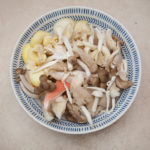By David Blyweiss, M.D., Advanced Natural Wellness
October 21, 2016
- Are bowel disorders genetic or environmental?
- The bugs in your bowels
- Stop “managing” your symptoms and take control
When bowel problems strike, diarrhea, abdominal pain and fatigue can send even the hardiest person running to their doctor’s office.
In many cases these types of symptoms are a one-time event caused by bad food or a viral infection… even excess gas or stress. It will generally run its course, and you’ll be feeling better again in a matter of days.
But if you have Crohn’s disease or another inflammatory bowel disorder (IBD), it’s never a “one time thing”. If it’s there now, it will always be a constant and painful reminder that all is not well within your body. So what can you do?
Well, you may have heard that Crohn’s disease is genetic… that you’re born with it and stuck with it for life. However, genetics are not your destiny and contribute far less than we anticipated after the Human Genome Project made its’ results available.
I’m told I actually harp on “ it’s never one thing” when it comes to explaining a chronic degenerative disease. Well it’s not.
MD Exposes the Hidden Danger to Your Eyes

When your eyesight starts to fail, it's a real problem. Suddenly you can't go to the grocery store... you can't get to the doctor if you have an emergency... you can't meet your friends for dinner…
Your "regular" doctor doesn't have time to keep up with the latest research. And the same goes for eye doctors. They go to school to learn how to fit you for glasses and contacts, but have no way of preventing the damage and loss of eyesight that threatens your freedom and independence.
Let me show you something that explains a LOT about how your eyes work.
In my FREE Special Report, I'll show you a HUGE, untapped resource for your eyes that safely and naturally restores clear, effortless eyesight.
Click here to get started...
In this letter today, I’m writing briefly on the other genetic material we all carry around, in our guts, the known beneficial bacteria.
The rest of the story is much longer. The readers’ digest version includes:
Some of us did not benefit from a regular birth delivery where we were gifted with our mothers natural flora…and/or we weren’t breast fed missing out on the supportive human milk oligosaccharides, colostrum and even more important bacterial flora…and/or we were given antibiotics multiple times wiping out the good bacteria before our immune systems had a chance to mature…and/or we were severely stressed or poorly nourished…and on top of that I had one patient who actually lived downstream from a Monsanto chemical plant.
But back to this article and the bugs in your bowels.
- In essence, Crohn’s disease is an abnormal immune response to something in your environment/lifestyle affecting the gut microbiome (the bugs) living in your gut and its’ soft mucosal lining. Not surprisingly, when 2/3’s of your immune ecosystem becomes dysfunctional something bad is bound to happen. It takes quite a bit of time and insults to the gut as well as a genetic propensity for something to break though.
- We can’t go into epigenetics here except to mention that food is information for your genes to code for a good path or a bad path on your life path…and depending on what’s on the end of your fork, feeds the good or bad bacteria. An issue that pokes its’ annoying head out is; genes encoded by the gut microbiota are over 100-fold more abundant than the genes of the human genome….and our gut microbiota have over 350 times more protein coding DNA than our own human DNA. So they’re pretty important to your gut health…feed them food not junk.
So, today we know that people with this bowel disorder have an over abundance of at least two types of bacteria in their intestines (e. coli and s. marescens). They also have higher concentrations of a particular type of fungus (Candida tropicalis).
At the same time, they have much lower levels of healthy microorganisms in their digestive tract.
As a result, here’s what happens….
Unhealthy microbes set up house in your gut and intestines. And if you don’t have enough “good” microorganisms to counteract them, your body just can’t handle it.
Are You Suffering From...
- Love handles and a pot belly
- Romance that isn't what it used to
- Forgetfulness and inattention
- Low (or no) strength and endurance
- A sex drive that's shifted into neutral...or worse
If so...you may have Mature Male Burnout. Click here to discover more about this unique condition and what you can do about it.
This sends alarm bells out to your immune system. But it overreacts. This, in turn, sets off an inflammatory response. It’s this combination of events that cause the pain, diarrhea and other symptoms of Crohn’s to rear their ugly head.
Herein lies the problem… and the solution… to naturally fight back against Crohn’s disease and other inflammatory bowel problems.
Stop “Managing” Your Symptoms and Take Control
Somewhere around two-thirds of your immune system is located in your gut. This means that everything you put into your body will affect your health in one way or another.
This makes it important to get rid of anything that has a negative impact on the environment of your GI tract.
- Unhealthy microbes thrive on foods like sugar, red meat, dairy and foods in general that are processed.
- Meat products from commercially raised livestock and farm-raised fish are loaded with antibiotics and other toxins. This further disrupts the distribution of healthy microbiota in your gut.
- Additionally, the glyphosate used on genetically modified (GMO) plant-foods destroys beneficial microbes that keep your digestive tract healthy and happy while supporting the growth of inflammatory bacteria.
So it’s in your best interests to restrict these foods. Instead, always choose organic produce, wild-caught fish, grass-fed beef and organic, pasture-raised poultry.
Then, go to work replenishing your digestive system with healthy microorganisms.
You can do this by eating more probiotic foods, like miso, kefir, sauerkraut and kimchi. I also recommend supplementing with a probiotic to re-colonize your gut. Look for one that contains a prebiotic along with multiple strains of lactobacilli, bifidobacter and other strains of healthy bacteria. The higher the colony count, the better.
It’s also a good idea to repair the injured lining in your digestive tract. You can do this with a good anti-inflammatory medical food shake. Select one that contains zinc, antioxidants (e.g., vitamins A, C, and E), curcumin and the amino acid glutamine.
Last but not least, supplement with a high-quality fish oil. The best ones come from fresh, wild-caught, deep sea fish, and are molecularly distilled for purity.
SOURCES:
Hamady M, Knight R. Microbial community profiling for human microbiome projects: tools, techniques and challenges. Genome Res 2009; 19:1141-52.
Halfvarson J. Genetics in twins with Crohn’s disease: less pronounced than previously believed? Inflamm Bowel Dis. 2011 Jan;17(1):6-12.
Benchimol EI, et al. Inflammatory bowel disease in immigrants to Canada and their children: a population-based cohort study. Am J Gastroenterol. 2015 Apr;110(4):553-63.
Foster A, et al. Changing Incidence of Inflammatory Bowel Disease: Environmental Influences and Lessons Learnt from the South Asian Population. Front Pediatr. 2013; 1: 34.
Hoarau G, et al. Bacteriome and Mycobiome Interactions Underscore Microbial Dysbiosis in Familial Crohn’s Disease. mBio, 2016 Sept. vol. 7no. 5 e01250-16
Thomas CM, et al. Probiotics-host communication: Modulation of signaling pathways in the intestine. Gut Microbes. 2010 May-Jun;1(3):148-63.






